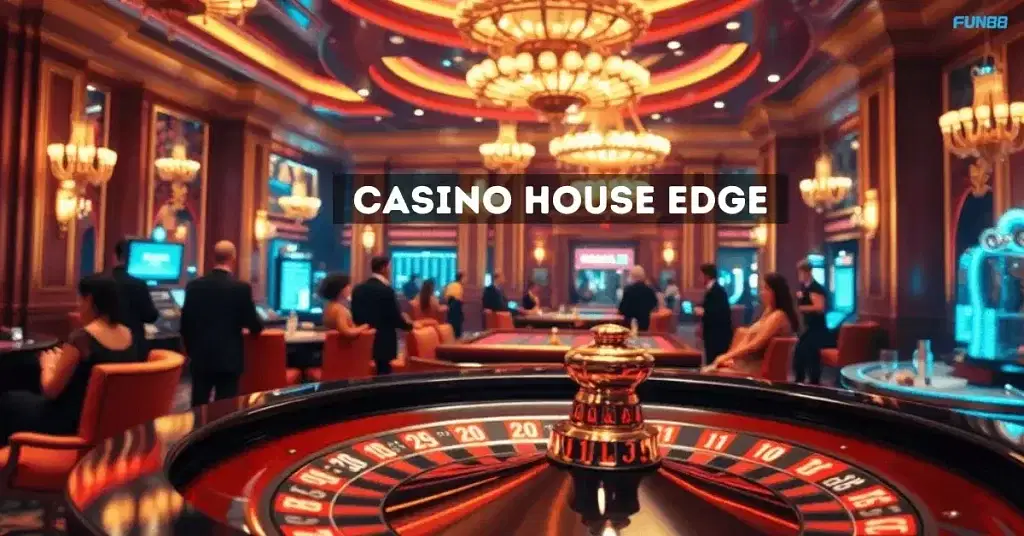Visit any casino, whether a glittering palace in Goa or a sprawling resort in Las Vegas, and you’ll hear one phrase often repeated with a resigned acceptance — the house always wins. It’s a universal truth that has puzzled and intrigued players for decades. But why is it so, even in online casinos? What magic keeps the casino profitable regardless of player fortunes? The answer lies in understanding the meaning of the house edge.
The Essence of House Edge
Let’s start by cracking the code. At its core, the house edge is a mathematical advantage built into each casino game, ensuring profitability over the long run. It’s the margin that allows casinos to maintain luxurious environments and offer those tempting freebies we’ve all come to associate with the gaming experience.
House Edge Meaning
The house edge meaning speaks to the statistical advantage the casino inherently holds in each game. Expressed as a percentage, it represents the average loss to the player from their total wagered amount. For example, if a game has a house edge of 5%, you could likely lose 5% of your overall wages over time.
Why the Edge Exists
So, why do casinos implement this? It’s simple – to ensure that the business remains a viable venture. Each game is designed not just for fun but as a method for revenue generation, with the house edge ensuring that regardless of individual wins by players, the casino remains ahead in the long game.
How Casino House Edge Works in Different Games
The magic lies in how the casino house edge is woven into various games. From blackjack to slot machines, each game is a tapestry of odds and probabilities, subtly favouring the house.
Blackjack
In blackjack, the edge comes from players acting first, which means they can bust before the dealer even draws a card. Blackjack basic strategy can reduce the house edge to as little as 1%, but it’s an ever-present spectre hovering over the game’s dynamics.
Roulette
Roulette is classic for its attractive wheel, but that extra zero (the double zero in American roulette) adds a sizable house edge. For European roulette, the house edge stands at around 2.7%, while in American roulette, it balloons to 5.26%, underscoring the importance of game variant selection.
Slots
Slot machines dazzle with lights and sounds, yet they often conceal a house edge ranging from 2% to 15% or more. The randomness of outcomes, controlled by RNGs (Random Number Generators), ensures the payouts align with the casino’s built-in advantages.
Baccarat
Baccarat’s simplicity belies a carefully crafted edge. The banker bet, which offers a 1.06% house edge, subtly shifts the odds in the house’s favour while giving off the illusion of equal footing.
Mitigating the Impact of House Edge
With an understanding of the house edge, players can make informed decisions to optimise their gaming strategies.
Game Selection
Choose games with a lower house edge. While blackjack and baccarat offer more favourable odds, avoid games like American roulette, where the edge is significantly higher. Understand which bets to make to reduce the house advantage effectively.
Mastery of Strategy
Mastering strategy significantly reduces the house edge in games with skill components like poker or blackjack. Learn and practice optimal strategies consistently to minimise losses and stretch your bankroll further.
Bankroll Management
Effective bankroll management is crucial. Setting a budget before play and knowing when to quit ensures the entertainment doesn’t become a financial woe. Playing within one’s means transforms gaming into a responsible pastime.
Understanding House Edge in Online Gaming
The virtual gaming space retains similar principles but offers unique aspects worth noting.
Online Casino Advantages
Online casinos often feature lower operating costs and thus can offer lower house edges than their brick-and-mortar counterparts. Promotions and bonuses may also offset the edge, making them a lucrative option for informed players.
RNG and Fair Gaming
Random Number Generators uphold fairness in outcomes online, ensuring the results are unpredictable and free from manipulation yet aligned with the statistical probabilities set by the house edge.
Responsible Gambling Practices
Awareness and understanding are keys to enjoying casino gaming responsibly.
Set Realistic Expectations
While casino games offer excitement and potential rewards, they are not a consistent source of income. Accept that the system is designed for entertainment, with a long-term tilt in favour of the house.
Self-Imposed Limits
Establish time and spending limits using tools provided by casinos to monitor play. Many platforms offer self-exclusion features for players to take a break if needed, promoting healthy gaming habits.
The Final Spin: Accepting the Edge
Ultimately, embracing the house edge’s inevitability allows for a healthier approach to gaming. By acknowledging the mathematical principles and psychological aspects that govern it, players cultivate a deeper appreciation for casino games, viewing them as vibrant puzzles crafted as much for amusement as for revenue.
House Edge FAQs
The house edge is the casino’s built-in statistical advantage in games, expressed as a percentage. It represents the average loss a player can expect over time from their total wagers, ensuring the casino profits despite temporary player wins, as games favour long-term casino success.
In roulette, the house edge exists due to the extra zero (or double zero in American roulette), which adds a higher edge. European roulette has a 2.7% edge, while American roulette’s edge is about 5.26%, giving the casino its profit margin over players.
Casinos design games with a house edge to ensure profitability. This edge allows casinos to cover operational costs and maintain services. It balances entertainment with financial viability, ensuring casinos remain lucrative businesses while offering players enticing gaming experiences.
Players can manage or reduce the casino house edge by choosing games with lower edges, such as blackjack or baccarat, and mastering their strategies. Effective bankroll management and knowledgeable gameplay can mitigate losses, allowing players to stretch their gaming sessions without exceeding budgets.
The gambler’s fallacy leads players to erroneously believe that losing streaks increase the likelihood of future wins. This misconception encourages continued betting beyond rational limits, benefiting the casino as players hope for improbable turnarounds, often losing more in pursuit of luck.
Online casinos often have lower operational costs compared to brick-and-mortar establishments, enabling them to offer better odds and lower house edges. Additionally, promotions and bonuses can offset the edge, attracting players by enhancing the perceived value of the gaming experience.
RNGs ensure fairness in online gaming by creating unpredictable outcomes continuously aligned with the house edge. They simulate unbiased results in digital games, upholding probabilities that guarantee long-term casino advantage while maintaining player trust in the platform’s integrity.
The house edge influences entertainment by structuring a balance where players can enjoy short-term thrills and potential wins while statistically ensuring the casino’s eventual gain. This predictive framework aligns with gaming’s primary role as a source of amusement rather than income.
Responsible Gambling Practices Include:
● Setting time and monetary limits.
● Understanding the house edge’s impact.
● Viewing games as entertainment.
Players should use tools for self-monitoring and periodically take breaks to ensure gaming habits remain enjoyable without becoming detrimental financially or emotionally.
Understanding the house edge empowers players to make informed game choices and strategies, setting realistic expectations about possible outcomes. This awareness transforms casino visits into enjoyable experiences, emphasising entertainment and strategic play, reducing stress and enhancing overall satisfaction with the gaming process.
Star it if you find it helpful.

